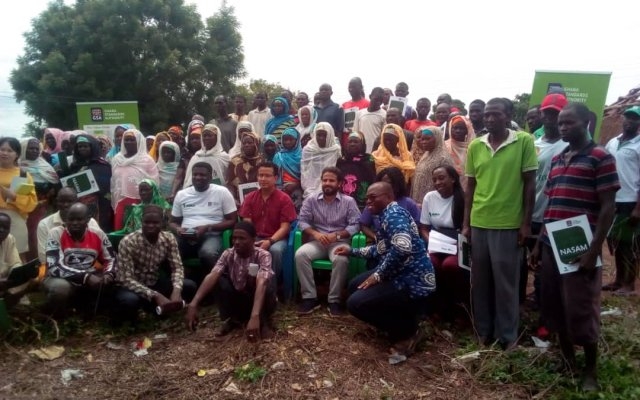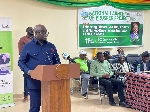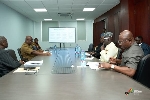N/R: GSA educates farmers on aflatoxin

The programme, which was organised on Wednesday, 29 May 2019, formed part of the National Aflatoxin Sensitisation and Management (NASAM) project supported by the Alliance for Green Revolution Africa, (AGRA) to educate farmers on best practices in the fight against aflatoxin.
Aflatoxins are a family of toxins produced by certain fungi that are found on crops such as maize (corn), peanut, cottonseed, and tree nuts. The main fungi that produce aflatoxins are Aspergillus flavus and Aspergillus parasiticus, which are abundant in the warm and humid regions of the world.
The farmers, males and females, were trained on pre-harvest processes to mitigate post-harvest losses.
They were also educated on how to avoid aflatoxins so as to be able to sell their produce at high prices.
The sensitisation was an all-inclusive agricultural transformation programme targeted at food safety and security through increased awareness creation about aflatoxins, their impact and management techniques.
Speaking exclusively in an interview with Class 91.3FM after the training, the Head of the Aflatoxin Laboratory at the GSA said the programme aimed at sensitising the farmers and equipping them with management standards that would minimise or eliminate the toxins from food.
Mr Derry Donto said: “We are just trying to explain to them that during cultivation, they have to use the right quality seeds, plough properly, apply limestone or calcium in the soil to reduce the toxin infestation, and just also after that ensure that they go by good harvesting practices by harvesting at the right time and ensuring that farm produce that are harvested are not laid on the bare floor because the moulds that bring about aflatoxins, called Aspergillus, are found in the soil and in the air.”
He advised the farmers to always burn their farm residue before weeding so as to destroy any microbial growth.
Meanwhile, the Mexican government, through the Nix Tamale project initiative, is offering technical support to the Ghanaian farmers to enhance food security and ensure economic development in the country.
The Deputy Head of Mission to Ghana, Marcos Moreno disclosed that the Nix Tamale session is focused on economic development, public health, women empowerment and food security. He observed that these four components were key to every country’s development.
According to Mr Moreno, the ancient technology the government of Mexico is sharing with Ghana cannot be underestimated. He said many other countries have adopted it and the results have been very positive, adding that the government, through the GSA, has been very supportive in implementing this initiative.
Source: Ghana/ClassFMonline.com/Mohammed Gadafi
Source: David Apinga
Trending Business

NYA CEO urges Yango couriers to be diligent and humble at 2025 Partner Conference
14:26
Agric Minister launches $147.3 m PROSPER project in Damongo to transform rural agriculture
14:15
BoG Governor assures Council of State of commitment to Cedi stability
12:15
Ghana signs seventh bilateral Debt Restructuring Agreement with Czech Republic
11:04
GIPC boss urges newly appointed Special Envoys to champion investment drive
10:05
Agri-Impact CEO welcomes gov't's massive agric budget increase
09:42
Main drivers of GDP growth in Q3 2025 are ICT, crops, trade, transport % storage, manufacturing and education – Govt Statistician
15:23
Take advantage of improving food conditions to rebuild savings – Government Statistician urges Ghanaians
15:20
Gov’t to roll out major VAT reforms in 2026 – Ato Forson
10:43
GIPC CEO engages U.S. Embassy on new investment bill
09:05



